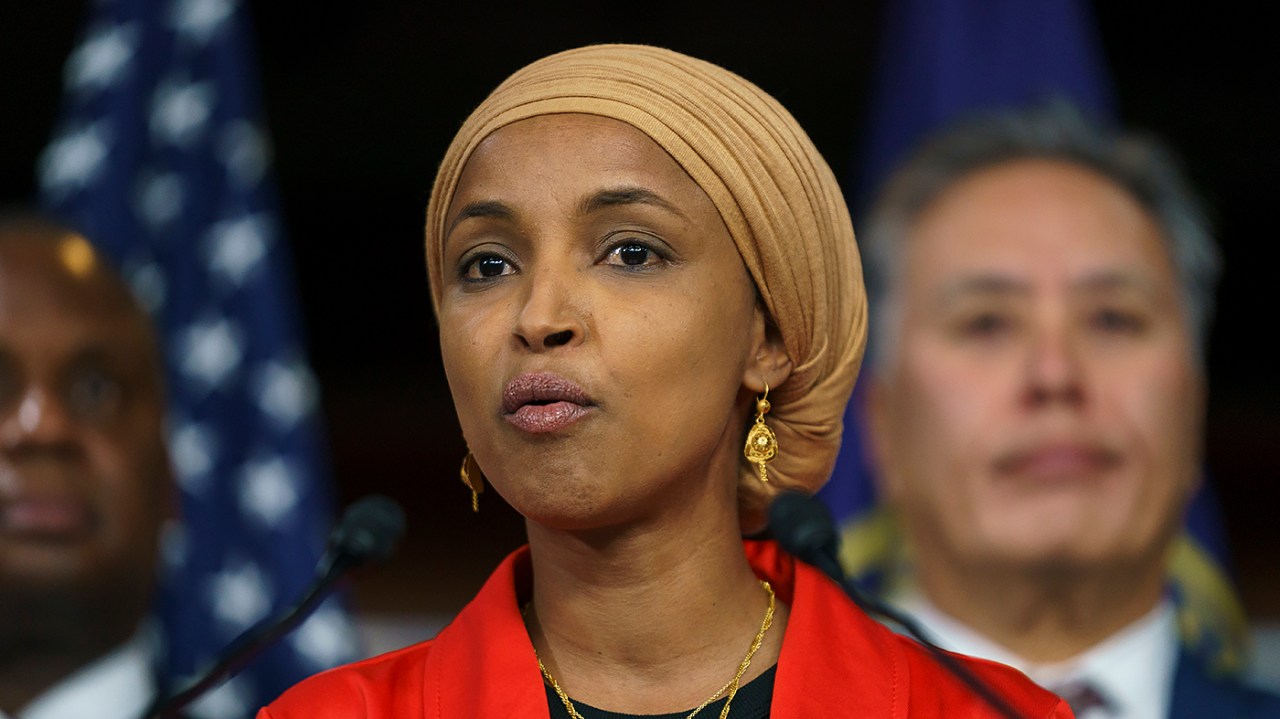Rep. Ilhan Omar (D-Minn.) said policy differences toward Israel between her and President Biden won’t stop her from supporting him in the November general election.
“Of course,” Omar said Tuesday, when asked by CNN’s Abby Phillip on “NewsNight” whether she would vote for Biden if the election were held that day, in a clip highlighted by Mediaite. “Democracy is on the line, we are facing down fascism.”
“And I personally know what my life felt like having Trump as the president of this country, and I know what it felt like for my constituents, and for people around this country and around the world,” Omar continued. “We have to do everything that we can to make sure that does not happen to our country again.”



An effective ban is still a ban. If you’re not in the club you will not win.
Obama was not rich before he ran for public office. Doesn’t seem like a ban to me.
That’s why it’s called a club and not a socioeconomic demographic. He was networked, blessed by the wealthy.
He was also blessed by one of the largest grassroots mobilizations in recent history, let’s not discount that as well.
The point being: someone who came from nothing can rise to something. Obviously a whole range of factors influence odds, from intelligence to external beauty, to charisma, to networks and wealth… Nobody said Democracy is perfect, but that doesn’t change the fact that we have more choice than most.
From nothing? The man went to Columbia and Harvard. His mother was an Anthropologist and Bank Consultant. His father was in the US with financial backing from wealthy celebrities, and went back to a leadership role in Kenya afterwards. His step father was literally an oil executive.
He was absolutely born connected and with plenty of money.
Many poor people go to Columbia and Harvard. His parents weren’t just gifted, they went to school and rose in money themselves. What exactly is wrong with that? This isn’t the Rockefellers, my friend.And you’re referring to the father who left him when he was – checks notes – 2-years-old…?
Per Michelle:
CBS Fact check:
Put another way, how the hell do you advocate to prevent this from occurring? I can see campaign finance/election reform ensuring publicly-funded elections, sure, but now you’re saying because someone’s parents went from rags to strong middle-class (they weren’t basking in millions as far as I can tell), then that’s diminishing choice to such an extent that we no longer have a democracy or… What?
The man she married 3 years later, Obama’s stepfather, was an oil company executive. They were never in danger of anything even close to “rags.”
And the problem here is not that we let a very smart man be president. The problem is he only got there because of the connections his parents had and the connections he made among the elite at those schools. There’s a lot of very smart, well educated, people who will never be president simply because they don’t know anyone who can write checks to cover the time off work and advertising necessary.
The system is setup to give the wealthy a natural veto on who can run for office at the federal level.
deleted by creator
I sympathize with this, but how do we genuinely address it? Since the dawn of civilization, it always has been about who you know and the steps your ancestors took to improve your position.
If a black man raised by his middle-class mother and grandparents can run on a scholarship and succeed in school, then work his way up through higher and higher public offices… I think that’s a testament to choice in America. I won’t sit here and say it’s perfect, but I take issue with the user claiming, “I don’t really have a choice” and “doesn’t sound like much of a democracy,” — I mean shit, you know how many people of other countries would kill to have what we have? He takes it for granted.
Because you’re still leaving out the part where he leans on his connections. And still painting his background as middle class.
As to what do we do? Jungle primaries, and ban private money in elections. You get X number of signatures and you get the same campaign funding as the next guy. With jungle primaries the parties aren’t in control. Then you uncap the house. It was always supposed to be a ratio that allowed people to actually know their representative. With the massive reduction in district size that means someone can actually get elected by walking the district again.
For reference the original ratio was 1:30,000. And while that’s a hilarious 11,000 Representatives today; even 1,000 representatives would see the current ratio drop from 700,000 to 300,000. That would put us near the 280,000 people per Representative we had in 1929 when we capped the number of Representatives.
Then with a thousand federal legislators there’s actually a chance of new parties forming among the caucuses in the House of Representatives too.